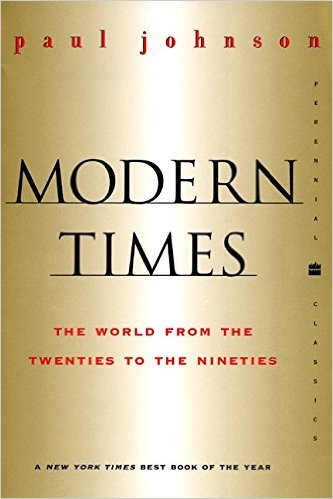
MODERN TIMES
BY PAUL JOHNSON (PUBLISHED 1992 BY HARPER PERENNIAL. 870 pages)
Paul Johnson is one of the most distinguished historians of recent times. Eminently readable, he has authored several best-selling books, many of which are standard reading fare for college and university history students. Modern Times has earned Johnson many accolades, including being listed as one of the top history books of the year by the New York Times.
Modern Times is a magisterial chronicle of the world from the end of the first World War on up to the 1980s. Johnson describes the main events, prime movers, and philosophical undercurrents that have shaped our modern world. Johnson weaves together politics, science, religion, economics, and other areas to create a coherent and unified narrative that is both erudite and enjoyable.
However, there is one big problem, namely that Johnson approaches his task from a conservative Catholic perspective which he never questions and which, to my way of thinking, seriously mars his value judgments. As a historian, I am well acquainted with the period Johnson is focusing on, and while I enjoy his style and general readability, I see revisionist theory behind much of his work. To cite one example of many Johnson, after discussing moral relativism and absolutism, refers to Leon Trotsky as the “most dangerous type of moral relativist” (pg. 263) in the mistaken belief that religion is absolutist because it has god as a foundation. The problem is obvious, at least to freethinkers, because there are so many different religious systems, each of them claiming to possess the “absolute” truth (and willing to kill and die to defend it against perceived enemies). So, Johnson’s moral absolutism is certainly no better than moral relativism. In fact they are pretty much the same thing, rendering both terms useless.
In fact, the whole issue of moral relativism vs. moral absolutism is the underlying theme of the book. Johnson begins his text with a discussion of Einstein’s theory of relativity, which destroyed the earlier concepts of absolute time. Johnson then transfers this concept into the socio-political realm. In other words, he is mixing apples and oranges. According to Johnson, all the horrors of the modern world emanate from society’s abandoning of absolute moral standards (meaning, of course, Judeo/Christian standards) and replacing them with relative, flexible standards which supposedly allow any dictator to set his own standards as the values for everyone else to follow. This specious reasoning, so common among today’s Religious Right leaders, completely ignores the fact that there are freethinking philosophers who have abandoned religious “morality” and developed codes of ethics based entirely on rationality. It is not atheists who bomb abortion clinics because some their religion demands that they do so; it is not atheists who start “holy wars” and jihads because some remote ancestor authored a text that stated that a god promised them certain lands and that heretics should be put to death.
One would think from reading Johnson’s various works that conservative voices rarely ever formulate and implement public policy (a silly canard often repeated by religious fundamentalists). Another central theme running through his books is that he seems to think that all the evils in the world come from left-wing intelligentsia sitting in their ivory towers expounding their unworkable social mores to the masses (See his book Intellectuals for an elaboration on this and note that all of his subjects’ alleged “evils” stem from their liberalism). He rails against the “liberal press” as the creators of the Watergate “witch hunt,” apparently agreeing with President Nixon’s famous quote that “if the president does it, it is not illegal” and condoning breaking and entering in the process.
Johnson is at once riveting and exasperating. It is hard to take some of his theses seriously, since they are so tainted by his fundamentalist Catholicism and right-wing ideology. He is a reactionary, revisionist writer who leaves out facts that contradict his theses, misinterprets and distorts other facts, and interprets everything according to his preconceived, myopic world view. No wonder that his conclusions are usually suspect; his methodology was corrupt from the start.
Categories: Book Reviews
